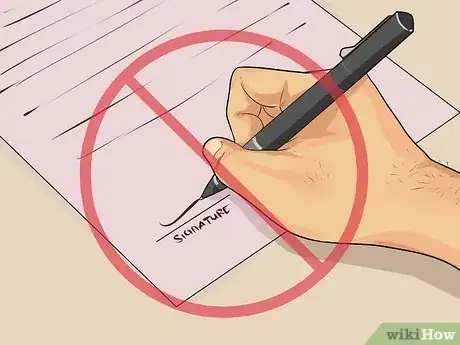This article was co-authored by Michael R. Lewis. Michael R. Lewis is a retired corporate executive, entrepreneur, and investment advisor in Texas. He has over 40 years of experience in business and finance, including as a Vice President for Blue Cross Blue Shield of Texas. He has a BBA in Industrial Management from the University of Texas at Austin.
There are 11 references cited in this article, which can be found at the bottom of the page.
This article has been viewed 141,524 times.
A severance package is a group of optional benefits awarded to a terminated or laid-off employee. Benefits may include additional salary, continued health insurance or other items. Your post-employment behavior, past employee performance and the company's financial situation all have bearing on your severance package. Use these tips to negotiate severance when you've lost your job.
Steps
Coping With the Loss of Your Job
-
1Remain professional. Whether you are informed days, weeks, or months before you are let go from your job, or if you are completely unaware until the day you are actually terminated, it is important that you remain professional. Remaining professional can help ensure you can use your employer as a reference in the future.[1]
- If you have a formal exit interview, you may have the opportunity to politely voice grievances.
- If you remain in the same career field, you could end up working with or even being interviewed by former co-workers. If you fail to remain professional upon termination, you may leave a bad impression with former co-workers, damaging your reputation or even disqualifying yourself from future job opportunities.
-
2Find out why you are being terminated. Whether you are given a lot of notice prior to your termination or it happens suddenly, this could be a great opportunity to find out how you can be a better employee. The meeting that occurs upon your termination should include some justification of why you are being let go. Pay attention to this to find ways to improve in future jobs.[2]
- If you are being laid off and are not given reasoning beyond that, you might ask why you were chosen over those who are not being laid off and/or ask for some feedback about your job performance in spite of the cutbacks.
Advertisement -
3Understand the seriousness of grief. Grief should be regarded as a kind of injury that requires time to heal just like a physical injury. Although grief is typically associated with the loss of a loved one, for instance, the loss of a job can be just as difficult or more so. Whether you are aware of your impending termination for a period of time before it happens or taken by surprise, you will likely experience some grief from the loss of your job.[3]
- Deal with your grief effectively by joining a support group, admitting the loss of your job and your emotions to others, and keeping a positive attitude and sense of humor.
Understanding Your Severance Package
-
1Clarify your severance pay. Every severance package is different, but almost all contain some kind of severance pay. Some severance packages may pay a terminated employee a lump sum, for instance, whereas others may pay out a sum over time in several payments. Make sure you understand how your severance pay will be distributed to you.[4]
- Find out if your severance pay includes any unused paid time off, such as paid vacation or sick days or holidays—some severances may take these into consideration, and if not, it can't hurt to ask.
- Find out whether the agreement asks you to waive any claim for unemployment compensation benefits.
-
2Clarify the availability of insurance benefits. When you are terminated from a job and offered a severance package, there may be insurance benefits available to you in addition to any severance pay. Insurance benefits received as part of a severance package may include group life insurance, health insurance, dental insurance, or vision insurance.[5] These items may not be included in a severance package (although they sometimes are), but again, it can't hurt to ask.
- If no insurance benefits are offered to you as part of your severance package, at the very least you may continue your coverage for up to 18 months at your own expense through the Consolidated Omnibus Budget Reconciliation Act (COBRA), provided the company from which you are being let go has at least 20 employees.[6] Insurance under COBRA is priced at the full cost the employer paid, to be paid by former employee. This can be very expensive.
- If you decide not to continue your employer-based coverage through COBRA, you can enroll in a plan through the federal Marketplace via a special enrollment period.[7]
-
3Review the details of the agreement. Your severance agreement may contain other details that you need to be aware of, such as what information you can or cannot share with another employer. These kinds of details may be the difference between whether you want to agree to the terms of the severance package or not. Review the agreement in as much detail as you can before accepting to make sure you are comfortable with the terms.[8]
- It might be worth seeking the advice of an employment lawyer to help you review the details of the agreement.[9]
Negotiating the Severance Package
-
1Be prepared for termination. Because you may be taken aback by your termination—even if you think it may be coming—it is a good idea to have a plan for negotiating your severance in advance. This will help you execute the smart decisions that need to be made during a time when you may be a little distracted by your emotions.[10]
- If you do not already have a lawyer, find one that can help you with negotiating your severance. An employment lawyer, in particular, would be helpful. This way you know exactly who to call upon your termination.
- An employment lawyer can also help keep you on track emotionally by guiding you through the severance package and advising you on negotiation.
-
2Consider the offer. Taking time to consider the offer is important because there are some aspects of the agreement that may affect you in significant ways. For one thing, the agreement you are required to sign may include a non-compete clause, which may bar you from employment in the same field for a certain period of time or prohibit you from bringing clients to a new company where you may work.[11]
- In many states, non-compete clauses have been rendered impotent and impossible to enforce. Check with your attorney.
- Another part of your agreement that may be important to carefully consider is any part that may limit your ability to sue the employer for discrimination, etc. If you feel you may have a case for this kind of legal action, you will want to be aware of any such clause in the agreement.
- Workers over 40 have 21 days to consider a severance agreement as part of the federal age discrimination law.[12]
- Be sure to compare your agreement with your employee handbook to be sure there are no discrepancies. If there are, bring them to the attention of an employment lawyer, or at least the employer.
-
3Negotiate the agreement. It is important that you at least try to negotiate the agreement. An employment lawyer may be able to help. Many employers may feel terrible that they have to let an employee go, and this may work in your favor in terms of negotiating a better agreement for yourself. Taking the initiative to at least try and get a better deal is important. Here are some things you might ask for:
- More money. If you are being paid a lump sum, try doubling it. If you are being paid a monthly salary for a period of several months after your termination, try doubling the number of months. This could include bonuses you were expecting or unused paid time off.
- Retention of equipment. You might ask to keep (or buy at a grossly reduced price) any equipment your employer has given you while you have been an employee, including computers, cell phones, etc.
- Use of spaces. You might be able to get your employer to allow you to use office space in order to find new employment, which can be helpful if you need to make copies of your resume, etc.
- Outplacement services. Some employers might be willing to pay for outplacement services, which can help you find a new job faster.
- Insurance benefits. You may be able to get insurance benefits paid for as part of your negotiation.
- Recommendation. You may be able to get your employer to agree to write you a recommendation as part of a severance agreement, which could help you secure a new job.
-
4Determine your ability to negotiate. If the company is experiencing financial difficulty, you may not be able to ask for more than what is being offered, but you may be able to trade one thing for something else you think you may need. For instance, perhaps you can trade some severance pay for insurance benefits.[13]
- If the company is not experiencing financial difficulty, you may not have to trade—or even offer to trade—any part of the agreement for additional severance pay or benefits, etc.
-
5Keep your situation in mind. When you are let go from a job, the company is likely doing so for its own benefit, but there are consequences.[14] Consider what not having a job may mean for you. If you have children or an ongoing medical problem that is expensive to treat, for instance, you may want to bring these things up in the negotiation.
-
6Speak up. The negotiation may work in your favor if you are the first one to suggest an alternative to the offer on the table.[15] For this reason, it may be wise to politely offer an alternative to the agreement as put forth by the employer that is above what you hope to get, and then let the negotiation work its way to what you are hoping to get.
- For instance, if you are offered six months pay but you want nine months pay, you might politely ask for 12 months of pay and let them counter. They may counter with nine months, and then you'll get what you are hoping for.
- Keep in mind that some employers will not be interested in negotiating, so be polite and do not get defensive, lest you end up with less than the original offer or nothing at all.
-
7Know which phrases may help you in the negotiation process. Certain phrases can be useful in keep negotiations friendly but productive. For instance, you might say "what kind of flexibility do we have here?" regarding the agreement. The drawback here is that in some negotiations the answer might simply be "none."
References
- ↑ http://career-advice.monster.com/in-the-office/leaving-a-job/Keep-Your-Cool-Heated-Resignation/article.aspx
- ↑ http://www.abajournal.com/news/article/advice_for_those_getting_axed_stay_calm_shut_up_and_listen/
- ↑ http://careersuccess.typepad.com/my_weblog/coping-with-the-emotions-of-a-job-loss-some-excellent-advice.html
- ↑ http://www.investopedia.com/articles/personal-finance/052214/seven-considerations-when-you-negotiate-severance.asp
- ↑ http://labor-employment-law.lawyers.com/employment-contracts/know-the-details-of-your-severance-package.html
- ↑ http://labor-employment-law.lawyers.com/employment-contracts/know-the-details-of-your-severance-package.html
- ↑ https://www.healthcare.gov/unemployed/cobra-coverage/
- ↑ http://labor-employment-law.lawyers.com/employment-contracts/know-the-details-of-your-severance-package.html
- ↑ http://www.forbes.com/sites/susanadams/2011/12/01/the-top-ten-reasons-to-hire-a-lawyer-to-review-your-severance-agreement/
- ↑ http://www.forbes.com/sites/susanadams/2013/04/12/how-to-negotiate-severance-3/
- ↑ http://www.forbes.com/sites/susanadams/2013/04/12/how-to-negotiate-severance-3/
- ↑ http://www.forbes.com/sites/susanadams/2013/04/12/how-to-negotiate-severance-3/
- ↑ http://www.how-to-negotiate.com/how-to-negotiate-a-severance-package.html
- ↑ http://www.how-to-negotiate.com/how-to-negotiate-a-severance-package.html
- ↑ http://www.inc.com/guides/2011/01/five-things-to-never-say-while-negotiating.html
About This Article
To negotiate a severance package, start by calculating how much paid vacation, sick time, or holiday pay you have unused to give you an idea what you might be offered. When you get the offer, ask questions like "What kind of flexibility do we have here?" to start the negotiation process. Ask for more pay than you need so that when they counter offer, you'll end up where you need to be. You could also ask for some supplies or a letter of recommendation as part of the negotiation. For advice from our Financial adviser on how to clarify insurance benefits after losing a job, read on!









































































